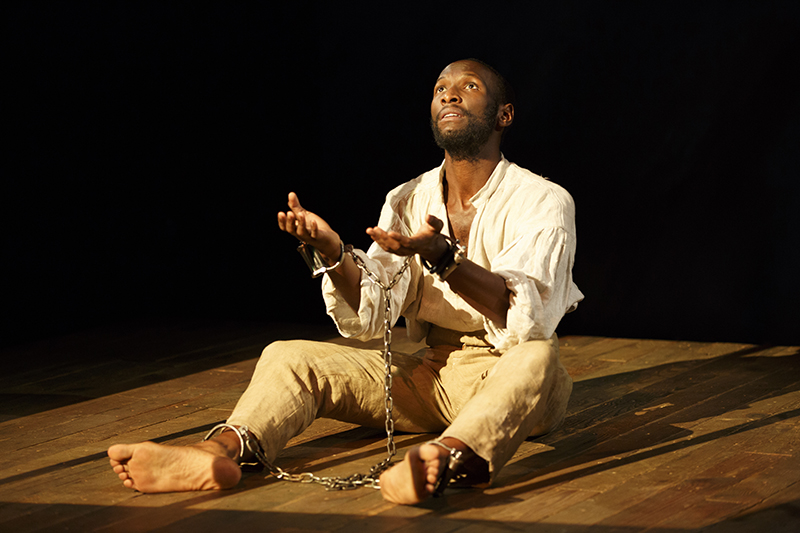Adelphi’s partnership with the New York Theatre Workshop is hands-on learning at its best.

“Nat Turner in Jerusalem,” produced by the New York Theatre Workshop
When playwright Nathan Alan Davis came to Adelphi this past June, he knew he had work to do.
As a participant in the New York Theatre Workshop’s 2050 Fellows program for emerging playwrights and directors, Davis had already completed the first draft of his new work, Nat Turner in Jerusalem.
But with rehearsals starting August 1, Nat Turner needed a period of intense, concentrated exploration by its writer, director, and actors.
That is exactly what the “NYTW at Adelphi” residency provided.
Since 2011, the New York Theatre Workshop has been spending seven to 14 days at Adelphi every June. The residencies include a kickoff retreat for that year’s fellows and two sessions of workshop retreats for projects in development, like Davis’ play.
“It’s never been the same in the five years,” NYTW artistic director Jim Nicola said of the residency, which at times has included forums for theater professionals. “We keep varying it to see what works.” Regardless of the format, he added, the residency “puts total focus on the artists’ work and their sense of community with other artists. And a beautiful campus like Adelphi, with fantastic facilities, makes it even better.”
“They really built it around whatever I needed,” Davis said of his June retreat, which was attended by the play’s director, Megan Sandberg-Zakian, and its actors, Phillip James Brannon and Rowan Vickers. “There was one day where we actually shortened rehearsals so I could do some more rewriting. I was bringing in new pages, we were reading those and discussing them. Then I’d go away and write some more.
“I knew the shape of the play, but I was still trying to figure out steps to make it grow,” he said. “Just having time together was a way to explore those questions and bring the script closer to where it needed to be.”
Davis keenly appreciated the contributions of two more members of the Nat Turner workshop team: Alyssa Hricko and Gary Smith, students in Adelphi’s Department of Theatre who were interns on the project. In addition to sitting in on the readings and discussions, Hricko and Smith participated in dramaturgy and did research on the historical accuracy of details in the script.
“Their energy and enthusiasm lent a real spirit to the process,” said Davis, who saw the interns as a crucial link between the NYTW artists and the University. “We weren’t just using the buildings, we were connected with the student body in a real way.”
For Smith, a theater major, a highlight was watching Brannon and Vickers exploring the play as it was revised, using the knowledge of their own characters to move the process forward. “Then, after the workshop sessions, we’d have meals together and just talk,” he said. “To hear the stories, and explore whatever we, as students, needed to talk about—understanding the industry, maybe, or a particular play that we happened to read…It was a fantastic opportunity.”
At Adelphi, the collaboration with NYTW was forged by Sam L Grogg, Ph.D., interim provost and executive vice president, in his former position as dean of the College of Arts and Sciences. “It seemed to me that the more we connected with professional theater organizations, especially those native to the New York area, the better for our students,” Dr. Grogg explained. With its focus on developing a diversity of voices and perspectives, the NYTW 2050 Fellows program parallels Adelphi’s efforts in fostering diversity at the University. “Our theater program especially is made up of a very diverse spectrum of students,” Dr. Grogg said, which reflects Adelphi’s commitment to inclusion “in all of its aspects.”
The collaboration with NYTW “is a model relationship for us, and we hope that it serves to inspire more such affiliations,” he continued. “The more we connect to the world around us, the better for everybody.”
Nat Turner in Jerusalem was presented at the New York Theatre Workshop in September. New York Times critic Ben Brantley noted the play for its “dialectical ingenuity” and “earnest, gravely lyrical” approach. A number of Adelphi students saw the show, including Hricko and Smith, who attended a performance together. “To hear some of the information we helped them find—to hear it used in the play,” Smith exclaimed, “we said, ‘This is amazing.’”
For further information, please contact:
Todd Wilson
Strategic Communications Director
p – 516.237.8634
e – twilson@adelphi.edu